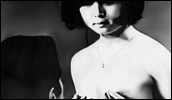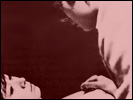Black Snow
- Year
- 1965
- Original title
- Kuroi Yuki
- Japanese title
- 黒い雪
- Director
- Cast
- Running time
- 88 minutes
- Published
- 21 November 2002


by Jasper Sharp
Credits roll over a static shot of a prostitute, lying prone on her back with all the aloofness of Manet's Olympia and nothing but the prostrate figure of a hulking black American GI stretched over her to mask her nudity. As the camera slowly pans along her bare flank, she raises her arm above her head to reveal a dense thicket of underarm hair.
Provocative stuff in a country where the one real taboo in the sexual arena was the onscreen portrayal of pubic hair, but it wasn't this scene which landed its director in court for Japanese cinema's first obscenity trial. As the screaming sound of jet planes which dominate the soundtrack of this brazen opening might suggest, Black Snow's subversion goes beyond the mere carnal.
The fourth film of Tetsuji Takechi is a flagrant piece of anti-Americanism, made at a time when students were taking to the streets in droves to protest against the renewal of the Anpo US-Japan Security Treaty. Set in a ramshackle prefab brothel lying in the penumbra of the Yokota Airbase, Black Snow tells the tale of a disturbed youth who, after spying on his mother with a black serviceman, finds himself unable to attain sexual arousal unless fondling a loaded pistol. Later that night, he stabs and murders the GI before running amok through the building and finally slaying his mother. Carted off by the military police, the film ends as he is gunned down by a firing squad.
With the five major studios rapidly loosing their grip on domestic distribution by the mid-60s, the proportion of films that fell under the 'erotic' category (the so-called 'pink film') had reached almost fifty percent. Independently produced and playing to audiences predominately made up of students and blue-collar males, many of these films shoehorned overt political criticism within their fleshy forms - for example, Koji Wakamatsu's Skeleton in the Closet, which found itself submitted to the 1965 Berlin Festival without clearance from the Japan Film Producers Alliance.
Dissident sentiments such as these had never been rendered quite so explicitly as in Black Snow however, whose soundtrack constantly throbs to the screech of the jets that Takechi referred to in his trial as "the American invasion". Released onto 19 screens in June 1965 - in the year following the Tokyo Olympics, an event which heralded Japan's arrival as a major world industrial power - this sort of thing clearly just wouldn't do, and Takechi was ceremoniously hauled off to court. The main reason cited is an extended scene reaching almost five minutes of a young girl running naked along the perimeter fence of the Yokota Airbase. "The censors are getting tough about Black Snow", he stated in his defence. "Prompted by the CIA and the US Army they say my film is immoral. This is of course an old story that has been going on for centuries. In fact it is a matter of rank political suppression".
Support from the intellectual artistic elite (of the right-wing inclination) was strong though, with among others, the novelist Yukio Mishima and Nagisa Oshima championing his cause. In fact, Oshima, who had spent the past four years working in TV and radio, cited the case as one of the reasons for his return to filmmaking: "There had never been a year in which film had received so many attacks from the outside. That is why Japanese film needed me. Pleasures of The Flesh was my response to that", he mentions in an essay published in Cinema, Censorship, and the State: The Writings of Nagisa Oshima. At the end of the day, Takechi was cleared of all obscenity charges, and immediately churned out a handful of sexy period pieces deeply rooted in traditional culture, including a version of Shikibu Murasaki's erotic classic of Heian literature, The Tale of Genji (1966).
For all its impact at the time however, Black Snow barely seems to be remembered by modern writers in Japan. Long deleted on video, Takechi's work has been given short shrift in the current nostalgic vogue for the heyday of Nippon erotica, which has concerned itself more with Nikkatsu's stylish Roman Porno line, the films of Koji Wakamatsu and the recently rediscovered Masao Adachi. Why? Because Takechi was very much considered an interloper in the industry, a dilettante dabbler in directing whose films were seen as "hobby work".
For those that have seen the film, the case is clear. A stylistically crude series of lengthy takes linked by zooms and laden with heavy handed symbolism (in one scene the youth takes a girl to the cinema to watch an American movie - we never see the screen itself, only the gunshots and shouted American dialogue, focusing on the couples faces as he fumbles beneath her petticoats, turned on by the onscreen violence), not to mention a preponderance of bewildering Oedipal motifs, in cinematic terms Black Snow is certainly no classic.
Like the director's other work however, for example his much later Oiran, which melds sumptuous period extravagance with exuberant cut-price exploitation, it's certainly a curio, and in its own way much deserves digging out and dusting down for a reappraisal. Vividly capturing the raw revolutionary zeitgeist of the times, it is an extreme embodiment of the sentiments and mores of a period in which aggressive politicising was allowed to run hand in hand with a healthy counter-cultural artistic scene. Meanwhile, almost 30 years on, Japan is still being periodically assailed by the scream of jet planes flying overhead, yet nowadays no one even bats an eyelid.